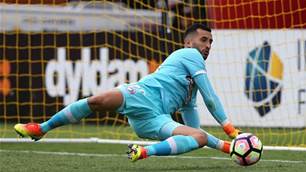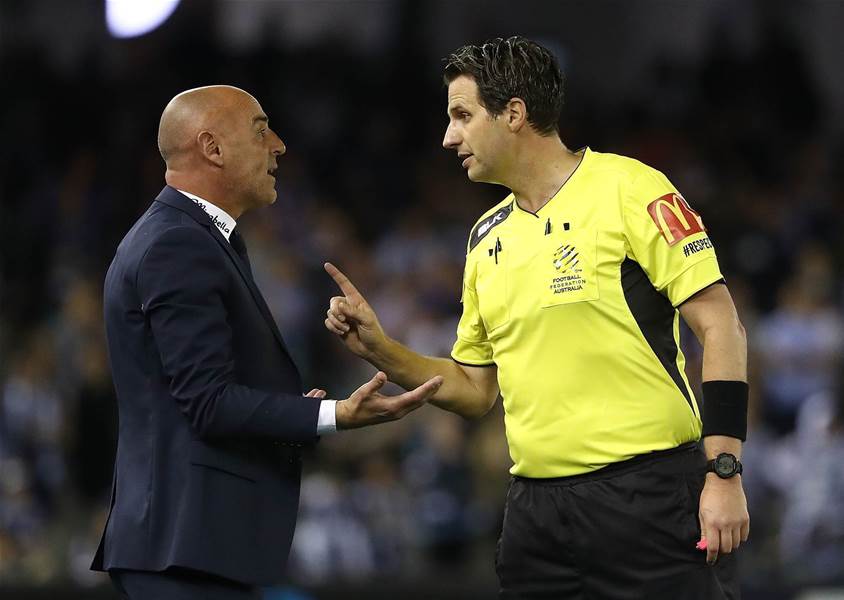In another world first, Football Federation Australia (FFA) will introduce yellow and red cards to team officials on the bench in A-League and W-League fixtures.
The A-League was the first professional league in the world to implement the Video Assistant Referee (VAR) and the competition is set for another first.
From this weekend onwards, referees will have the ability to hand out cards to team officials sitting on the sidelines.
“Referees already have a process which is by way of conversation to Coaches to warn them before removing them from the technical area after poor behaviour. Essentially, this trial will visualise those steps and as such better communicate to fans that the Referees are giving the coaches and others formal warnings." said Head of the A-League and W-League, Greg O’Rourke.
“It will help fans and viewers better understand the issues that match officials face on a weekly basis and help promote respect towards them. Importantly it will send a strong message throughout the game at grassroots level that poor behaviour towards match officials and opposition team officials is unacceptable and carries consequences."
“In addition, we have also updated our regulations so this consequence of accumulating yellow cards for team officials will be in line with the same regulations for players and will lead to Coaches and other team officials being required to miss games when the accumulation reaches the thresholds.”
“The ideal outcome of the trial is to improve behaviour from within the technical area towards match officials and also between team benches,” concluded O’Rourke.
From the FFA statement:
Guidelines to match officials for cautioning and dismissing team officials and players within the Technical area
- Referees will use their judgement when deciding whether behaviour by a team official requires a warning (Ask), a caution (Tell) or dismissal (Remove).
- Yellow card and red card infringements by team officials are specified in the relevant Disciplinary Regulations.
- A team official who accumulates Yellow Cards during the course of the season and respective Finals Series will serve suspensions in line with the relevant competition regulations.
- The following examples are provided as guidelines for match officials.
Warning offences / “Ask” – unacceptable behavior
Include (but not limited to):
- Minor / low level disagreement (by word or action) with a decision
- Failing to cooperate with a match official e.g. ignoring a 4th Official’s instruction / request
- Persistent questioning of refereeing decisions
- Entering the field of play in a respectful / non-confrontational manner (including attempting to assist in a non-confrontational situation)
- Leaving the technical area in a non-confrontational manner (e.g. running down the touchline in excessive goal celebrations)
Caution (YC) offences / “Tell” – irresponsible behaviour
Include (but not limited to):
- Persistent / repeated unacceptable behaviour (including repeated warning offences)
- Dissent by word or action including:
- Throwing / kicking drink bottles or other objects to show dissent (i.e. non-aggressive manner, not on the field, not at someone)
- Gestures which show a clear lack of respect for the match official(s) e.g. sarcastic clapping
- Gesturing or acting in a provocative, derisory or inflammatory way, including gesturing for a RC or YC to be shown
- Clearly / persistently not respecting the confines of their team’s technical area
- Deliberately entering the technical area of the opposing team (non-confrontational)
- Delaying the restart of play by their team
- Showing a lack of respect for the game
Dismissal (RC) offences / “Remove” – serious irresponsible behaviour
Include (but not limited to):
- Violent conduct (including kicking or throwing a water bottle or other object in a dangerous or aggressive manner)
- Deliberately throwing / kicking an object on to the field of play
- Physical or aggressive behaviour
- Using offensive, insulting or abusive language and/or gestures
- Spitting at any person
- Entering the field of play to interfere with play or an opposing player
- Deliberately leaving the technical area to:
- Act in a provocative or inflammatory manner
- Enter the opposing technical area in an aggressive or confrontational manner
- Delaying the restart of play by the opposing team e.g. holding on to the ball, kicking the ball away, obstructing the movement of a player
- Receiving a second YC in the same match
Related Articles

Socceroo-in-waiting seals Championship deal

Fringe Socceroo swerves A-League to remain in Europe after Fulham exit













